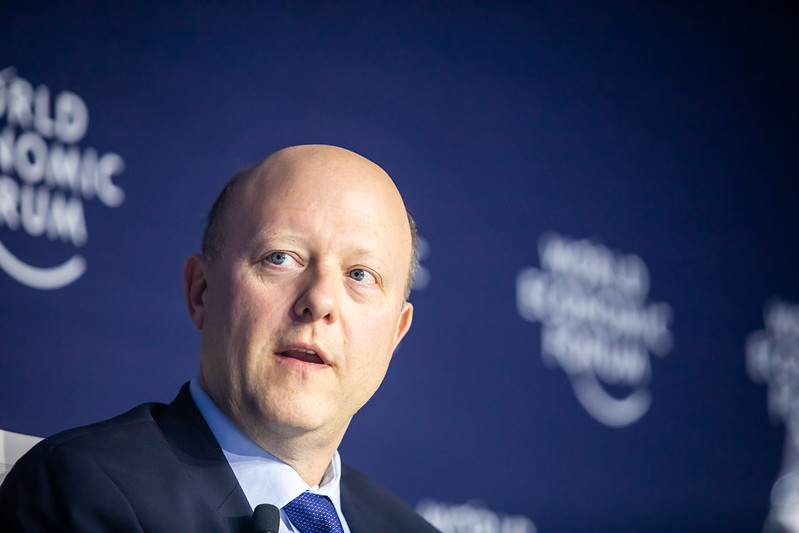October 30, 2020

Before I introduce today’s show, a quick message for those who are listening on the first day it posts -- October 30. I’m pleased to say that I’ve been nominated for the CB Insights Fintech Hall of Fame, along with some very distinguished people who have been our guests on Barefoot Innovation -- Chris Larsen, Brett King, Anne Boden, Kathryn Petralia, Jon Stein, Laura Spiekerman, and Colin Walsh -- and other great innovators. If you get a chance today, please vote!
When I started my senior fellowship at Harvard in 2015, I moved into the Boston “Innovation District,” an old neighborhood where rough brick streets slope down to Boston Harbor. A few blocks from my apartment was one of Boston’s most exciting young fintechs, Circle. Today’s guest, Circle CEO Jeremy Allaire, was a guest on my podcast show back then. Today, he’s back. And what a world of change has transpired in these five years.
The original idea behind Circle was Jeremy’s interest in using open standards and permissionless protocols, like the internet, to make the world work better. That logic drew him to crypto and to the idea of taking traditional currencies and representing them as digital currencies that would work like the dollar but be imbued with the superpowers of the internet -- with money becoming a native data type on the internet, governed through standard protocols.
The firm initially focused on consumer payments using Bitcoin, but eventually rebuilt their model based on Ethereum and built a new protocol called USD Coin. Today, USDC is the leading and fastest growing regulated stable coin in the world.
In our conversation, Jeremy explains what’s behind the meteoric rise of digital dollar stable coins. He describes their expansion in 2019 as the crypto ecosystem gravitated to quality, compliant and trusted digital dollar stable coins, and as hundreds of companies began to adopt USDC and add it to their products. And he talks about the dramatic growth surge in 2020, driven in part by the pandemic, as the infrastructure matures, use cases increase, and major institutional investors increasingly treat stable coins as a legitimate asset class.
Our talk covers fascinating terrain: the opportunities for programmable money; how smart contracts can be used to represent increasingly complex kinds of financial arrangements without intermediaries; how this has created internet-based credit markets that exist entirely in code and are governed by software on the internet that is completely transparent; and how an internet of money differs from the internet of information in requiring more robust governance. Jeremy describes setting up the CENTRE consortium with Coinbase to provide that governance system.
Jeremy also shares his views on the challenges that all this creates for financial regulators, and what it will take to meet them.
Finally, Jeremy argues that change is exploding due to the open nature of these innovations -- creating, as he puts it, the “combinatorial explosion” that is enabling new, better financial solutions we could not have imagined, even a few short years ago.
For me, this was one of the most thought-provoking discussions I’ve had in a long time.
More on Jeremy
Jeremy Allaire is Co-Founder, Chairman and CEO of Circle, a global financial technology firm that enables businesses of all sizes to harness the power of stablecoins and public blockchains for payments and commerce worldwide. Founded in 2013, Circle is the pioneer of the fastest growing fiat-currency backed stablecoin, USD Coin. Previously, Mr. Allaire co-founded and led multiple global internet technology companies with thousands of employees, hundreds of millions of consumers served, and multiple successful public offerings on NASDAQ. He has provided expert testimony on digital assets and monetary policy before the US Senate Committee on Homeland Security & Government Affairs and US Senate Banking Committee. A member of the International Monetary Fund (IMF) High-Level Advisory Group on FinTech. Mr. Allaire provides perspective and policy recommendations at the highest levels inside financial bodies across the US, UK, and Europe.
More for our Listeners
Please follow AIR on LinkedIn and Twitter, and also follow me personally on Twitter @JoAnnBarefoot. And please be sure to leave us a five-star rating on your favorite podcast platform.
AIR’s TechSprint on Cryptocurrency and Protecting Children from online child sexual abuse material (CSAM) culminated on October 23. Crypto is a fast-growing way to purchase this kind of content, and we had three teams work on ways to find these crimes. Our Demo Day speakers included Michael Dondarski from FinCEN, Senator Rob Portman, Congressman Anthony Gonzalez, Ripple Executive Chairman Chris Larsen, Jesse Spiro of Chainalysis, New York DFS Superintendent Linda Lacewell, and Ashton Kutcher and Julie Cordua of Thorn, as well as Sandra Ro of the Global Blockchain Business Council. The sprint teams demonstrated the solutions that they had worked on throughout the week. They have been invited to present their concepts to the senior leadership of FinCEN.
The event unexpectedly found some actual leads meriting further investigation as possible CSAM, which were referred to law enforcement. The whole effort demonstrated the power of reducing information silos and bringing together subject experts and software developers.
Upcoming podcasts are a great lineup. The next show will feature Renaud Laplanche, Co-founder and CEO of Upgrade. We also have Scott Cook, Founder of Intuit; Ann Cairns, Executive Vice Chair of Mastercard; and Ross Burhdorf and Lamine Zarrad of ZenBusiness. We’ll also welcome back former CFTC Chairman Chris Giancarlo, along with Daniel Gorfine, to talk about the Digital Dollar Project.
There are many speaking engagements still ahead to round out 2020! You can join me at A-Team Regtech Summit, Central Bank of the Future, DC Fintech Week, Fintech Americas, and ABA Financial Crimes Enforcement Conference, as well as the Singapore Fintech Festival and Fintech Abu Dhabi.
Stay informed by joining our mailing list
